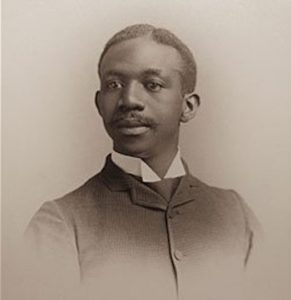
Clement G. Morgan, 1890
*Clement G. Morgan was born on this date in 1859. He was a Black attorney, civil rights activist, and city official.
Clement Garnett Morgan was born into slavery in Stafford County, Virginia. When the Emancipation Proclamation freed him and his parents in 1863, they moved to Washington, D.C., where Clement attended the M Street High School and trained as a barber. After finishing high school, he moved to St. Louis, Missouri, where he taught for four years in an all-black school. Morgan moved to Boston and attended the Boston Latin School for two years in preparation for college. While there, he earned a Franklin Medal and won Lawrence Prizes for declamation and reading.
He was 27 when he enrolled at Harvard University a few months later. While at Harvard, Morgan worked in a barber shop on Shawmut Avenue and won several scholarships. During his senior year, he won the Boylston Prize for oratory; his classmate, activist W. E. B. Du Bois, came in second. Morgan received his B.A. in 1890 and his LL.B. from Harvard University Law School in 1893. He was the first African American to earn both degrees at Harvard. Du Bois became the first African American to earn a B.A. and a Ph.D. from Harvard the following year.
As a student, Morgan showed an interest in civil rights activism. On July 8, 1890, he made a stirring speech on "Race Unity" at Charles Street A. M. E. Church in Boston, before a large gathering of the Colored National League. In Morgan's speech, he stressed the importance of education, asserting that African Americans "should be given every chance of cultivating heart and head" and urging listeners to save money and send their sons to college. He also declared his pride in his ancestry uncertainly: "I am glad to be a negro, and I mean it from the bottom of my heart. I mean to be a negro. On the bottom of my heart is written negro. If any of you are ashamed of your blood, it is cowardice." Soon after graduating from law school, Morgan was admitted to the Suffolk bar.
As an attorney, Morgan, with his good friend Butler R. Wilson, fought the extradition of a black factory worker named Monroe Rogers to North Carolina, arguing that he was likely to be lynched there. The following year, Morgan successfully represented black parents in Sheffield, Massachusetts, who refused to send their children to the Plain School, a segregated school for the town's 33 black children. The school was shut down.
Morgan was one of the original 29 members of the Niagara Movement, a civil rights organization founded in 1905. Morgan was later active in the Boston branch of the National Association for the Advancement of Colored People (NAACP), which was presided over by Wilson. Morgan and Wilson worked together again in 1915 when, with William M. Trotter and other activists, they led an unsuccessful effort to ban The Birth of a Nation from Boston theaters.
At one rally, Morgan demanded the recall of Mayor James Michael Curley, who refused to ban the film. In the 1920s, New England experienced increased anti-Catholic Ku Klux Klan activity; by allying with the Catholic Church, Trotter could get the film banned in 1921. Morgan lived on Columbia Street in Cambridge until 1897.
That year he married Gertrude Wright in Springfield, Illinois, and moved to 265 Prospect Street in the neighborhood of Inman Square. No children are mentioned in his obituary. The Morgans belonged to several of the city's exclusive social clubs, including the Omar Khayyam Circle, a black literary and intellectual group that met at the Cambridge home of Maria Baldwin. Clement Morgan died on June 1, 1929, at the Corey Hill Hospital in Brookline, Massachusetts. Clement G. Morgan Park in the Port/Area 4 neighborhood of Cambridge was dedicated to him on February 11, 1991. He is memorialized at the site with a plaque and a mural.